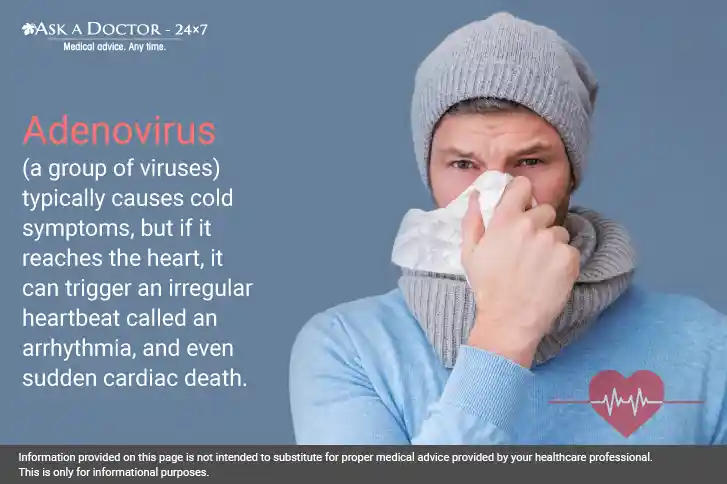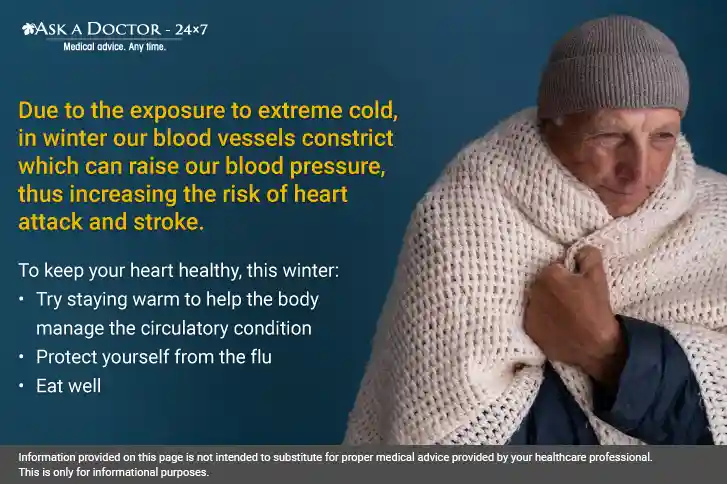How Freezing Winter Weather Increases The Risk Of Heart Attack?
Cold weather makes the heart work harder to keep the body warm, and as a result, your heart rate and blood pressure tend to increase during winter months. These changes can cause heart problems like a heart attack, especially if someone already has a diagnosed heart condition. Being outside in ice-cold, freezing climates for too long or over-exerting oneself during the winter season doubles the risk.
Notwithstanding the risk a change in the season poses, there are some easy-to-follow methods to protect yourself while enjoying the weather. Read more to find out how cold, cloudy conditions can affect your heart health.
How Freezing Winter Weather Increases the Risk of Heart Attack?

Freezing weather can cause hypothermia in older adults, making their bodies lose heat rapidly. During hypothermia, the heart must work harder to maintain the body’s temperature above 35 degrees Celsius. Cold weather can increase the risk of blood clot formation, responsible for heart attacks and strokes. This is also the leading cause of death in seniors during winter. In addition, the other two obvious reasons are:
1. Excessive workout raises blood pressure during the winter season
While being active helps people stay warm during colder months, the elderly may benefit more from avoiding the added strain on their hearts. If you have hypertension, you should be aware that blood pressure rises significantly during the winter season. Your heart’s health can also affect your ability to exercise.
2. Consuming Alcohol Immediately Before or After Being Outdoors
Alcoholic drinks consumed before or after vigorous outdoor activities can slow down reaction time and cause a lack of coordination. After a few drinks, you may feel warmer and underestimate the risk of hypothermia. To find out more about how alcohol can affect your heart, you can ask a cardiologist online.
Identify the Warning Signs Of Winter Induced Risk for Heart Attack
Most of the time, if the heart muscle does not get enough oxygen, people can identify the symptoms. If you’re unsure, consider consulting an online cardiologist, because even the subtlest signs of a heart attack can be fatal. Watch out for:
- Chest pain: Any pain, pressure, or discomfort in the chest area should be reported and thoroughly investigated. At times these feelings are intermittent. DO NOT ignore them even if they go away in a couple of minutes on their own.
- Pain or pressure in other parts of the upper body: Some people may feel no pain in their chest. Instead, they would feel a slight discomfort around one or both of their shoulders, arms, back, neck, or jaw. Some people even get indigestion-like symptoms such as nausea and vomiting when they’re having a heart attack.
- Other symptoms: Feeling out of breath without being physically active is a warning sign of a heart attack. Some people may also break out into a cold sweat on a cold, rainy, and cloudy day if they’re having a heart attack.
Things to Do to Reduce the Risk of Heart Attack in Winter

Follow these simple good health habits mindfully to reduce your risk of winter weather-induced heart health concerns:
- Do Not Skip Your Influenza Vaccination Shot: If you have been delaying your influenza vaccination, remember, it’s (NOT) just for the flu! Heart attacks are more common immediately following an acute bout of seasonal flu. Seniors should also get pneumococcal vaccines to protect themselves against pneumonia, meningitis, and bloodstream infections. Some precautionary measures should be taken while administering certain vaccines to people who have heart disease. Common cold medications can interact with your prescription medications. Always ask your doctor before taking over-the-counter medicine for cold and flu.
- Go for Regular Screening: Be aware of the risk of a silent heart attack. A silent heart attack does not show the obvious symptoms. People who consider themselves healthy often fail to recognize the signs of a heart attack. Do not skip your regular health checkups for flimsy reasons like, 'It’s too cold to go out'. Keeping your hypertension and hypercholesterolemia in check is the key to avoiding heart attacks. Some of your medicines, such as hormone replacement therapy (HRT) medications, can increase the risk of blood clots, which is a leading cause of myocardial infarction.
- Eat a Healthy Diet for A Healthy Heart: Choose foods that are low in calories but high in fiber, vitamins, minerals, and other nutrients. Include plenty of seasonal vegetables and fruits in your diet. Eat a balanced meal that includes whole grains, low-fat dairy products, fish, poultry, and nuts for a healthy heart. These foods also improve your immunity against cold and flu. Do not let the cold weather tempt you into indulging in comfort foods that are not healthy for your heart. Try a bowl of homemade vegetable soup instead. DO NOT smoke or drink alcohol.
Conclusion
Studies have confirmed that the lower the temperature, the higher the cholesterol and blood pressure, and the lower their vitamin D levels, and all these cumulatively can increase the risk of heart and circulatory diseases, especially in those with other comorbid conditions. This occurs because blood vessels respond to low temperatures by constricting, which in turn, increases blood pressure and reduces circulation, putting strain on the heart. Therefore, cold weather exposure can increase the risk of cardiac responses, including heart attacks.
Signs of a heart attack can be different in men and women. If you experience any symptoms of a heart attack, call for help immediately. For any queries related to heart health, Talk to a Cardiologist online at Ask a Doctor 24x7.
Recently Answered Queries Related to Heart Health
- What Causes Heart Attack?
- Do People Who Have A Silent Heart Attack Always Have A Second Heart Attack?
- Have Pain In Chest. Is It Normal To Feel Like Having A Heart Attack?
- Heart Attack & Indigestion
- What Causes Cold Temperature In the Right Hand?
- Suggest Treatment For Symptoms Of Heart Attack
- What Causes Vomiting, Cold Sweats, And Pressure In The Arms, Head And Shoulders?
- Does Drinking Cold Water After Meal Leads Heart Attack?
- Can Taking Cold Showers Cause A Heart Attack?
- Is Cold Sweat A Symptom Of Heart Attack?
Disclaimer: Information provided on this page is not intended to substitute for proper medical advice provided by your healthcare professional. This is only for informational purposes.
Ask a Specialist
Recent Questions


